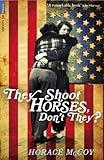It’s a single line of dialog in Ernest Hemingway’s classic story, “Hills Like White Elephants,” but that one line, 11 words, has had an outsized influence on the course of literary titling. It’s spoken by the female character, Jig, as she waits for a train in Zaragosa with her unnamed American man. In the train station they begin drinking, first cervezas then anisette, and soon conduct a suppressed dispute about whether or not to end a pregnancy. Tensions mount, differences are exposed, and with that, Jig utters the legendary line. It’s a breaking point that is as much textual as emotional: “Would you please please please please please please please stop talking?”
Hemingway couldn’t have known the legacy that line would have — or maybe he did, he famously sought “a prose that had never been written.” When the story was published in 1927, the line broke open a new way characters talked on the page. Exactly four decades later, that groundbreaking colloquy resurfaced as a stylistic approach to the contemporary American literary title. Raymond Carver’s story, “Will You Please Be Quiet, Please?” published in 1967 (the titular collection appeared in 1976), echoed Hemingway’s line, and in turn spawned a subgenre of titling in the vernacular style.
What I’ve come to think of as the colloquial title rejects literary tone for the purely voice-driven. Colloquial titles can be wordy, even prolix, and often make use of a purposefully curious yet catchy syntax. The colloquial title is based in common parlance, but also draws on aphorism, the stock phrase, and familiar expressions. For a more elevated voice-driven title, look to the literary/biblical allusion, the colloquial title’s highborn cousin. With exemplars like As I Lay Dying and Slouching Toward Bethlehem, the allusion-based title has undisputed gravitas, and frankly, when it comes to authoritative tone, is hard to beat. Think of The Violent Bear It Away and A River Runs Through It.
And yet, ordinary language is equally capable of authority. Like any compelling title, those based in the vernacular can deftly portray a sense of foreboding, loss, or lack. Plus, when ordinary language is placed in a literary context, meaning can shift and complicate, taking shades of tone it might not otherwise. It might even be said that, unlike the conventional variety, the colloquial title is captivating even when its message is trouble-free.
There is a certain power in hearing phrases we know and may have used ourselves. When a title speaks to us in everyday language, it’s not so different from any voice aiming to get our attention. I read a colloquial title and hear a speaker with an urgent message. Maybe like Jig’s, its phrasing is odd, idiosyncratic. Or, where one speaker might as easily equivocate, another may cut in, or confess. Or be presumptuous and opinionated. Whatever the persona, the colloquial title leans in close and says I’m talking to you, and I listen, eager to know what lies beyond that strangely familiar voice.
Here then is a sampling of colloquial titles, culled from eight decades of classic and contemporary literature.
1. Classics of the Form
 An early example of the colloquial impulse is Horace McCoy’s They Shoot Horses Don’t They? (1935). The title of this Depression-era portrait adopts ironic tone to reference the period’s human desolation and the suffering of its characters.
An early example of the colloquial impulse is Horace McCoy’s They Shoot Horses Don’t They? (1935). The title of this Depression-era portrait adopts ironic tone to reference the period’s human desolation and the suffering of its characters.
William Gass’s collection In the Heart of the Heart of the Country (1968) uses the power of repetition to suggest a journey to the deeper realms of character and place. The recursive device proved influential, as demonstrated by more than a few of the examples that follow here.
Leonard Michaels’s I Would Have Saved Them If I Could (1975) is an exemplar of the colloquial approach. The title seamlessly integrates the prose style of the collection and its mood of uncertainty and pathos.
 Charles Bukowski’s You Get So Alone at Times That It Just Makes Sense (1986). Bukowski’s style pays a debt to the Hemingway prose style, to the confessional tone of the Beat Poets, and, to this reader’s ear, the personalized truth-telling of the ’60s.
Charles Bukowski’s You Get So Alone at Times That It Just Makes Sense (1986). Bukowski’s style pays a debt to the Hemingway prose style, to the confessional tone of the Beat Poets, and, to this reader’s ear, the personalized truth-telling of the ’60s.
David Foster Wallace’s A Supposedly Fun Thing I’ll Never Do Again (1997). The distinct SoCal syntax and wry tone make this title a classic of the colloquial style.
2. The Aphoristic Vein
Common phrases and well-worn adages make ideal colloquial titles. Somehow, in a title, platitudes and cliché never feel stale, but spark irony and double-meaning.
 Flannery O’Connor’s A Good Man is Hard to Find (1955). The title is drawn from a popular idiom of its day, and the homespun tone runs against the grain of the titular story’s mystical, violent drama.
Flannery O’Connor’s A Good Man is Hard to Find (1955). The title is drawn from a popular idiom of its day, and the homespun tone runs against the grain of the titular story’s mystical, violent drama.
William Maxwell’s novella So Long See You Tomorrow (1979) and Elizabeth McCracken’s collection Here’s Your Hat What’s Your Hurry (1993). Both operate on the familiarity of common parlance (and what might be called the gravity of goodbye), not to mention direct address: we read “you” and feel at once a stand-in for the addressee.
 Jean Thompson’s collection Who Do You Love (1999). While a good number of colloquial titles take the form of a question, Thompson’s intentionally drops its question mark. The lyric from the Bo Diddley song is used without its original punctuation, shifting the phrase to an assertion, a stark refrain that echoes throughout the collection.
Jean Thompson’s collection Who Do You Love (1999). While a good number of colloquial titles take the form of a question, Thompson’s intentionally drops its question mark. The lyric from the Bo Diddley song is used without its original punctuation, shifting the phrase to an assertion, a stark refrain that echoes throughout the collection.
Amy Bloom’s collection A Blind Man Can See How Much I Love You (2000). Here, aphorism meets avowal and reflects the fierce attachments that occupy Bloom’s stories of youth, aging, loss, and hope.
 Adam Haslett’s collection You Are Not a Stranger Here (2002). Another appropriation of dialog. Here, the outsider tone is a salutation that is both welcoming and sorrowful, and likewise defines the collection.
Adam Haslett’s collection You Are Not a Stranger Here (2002). Another appropriation of dialog. Here, the outsider tone is a salutation that is both welcoming and sorrowful, and likewise defines the collection.
3. Matters of Opinion
This colloquial vein might be called the idiosyncratic declarative, a variety of title distinguished by off-kilter observation, unconventional syntax, and the frequent use of personal pronouns:


 In this category, Raymond Carver alone spawns a near-genre of declarative titling. The story collections Will You Please Be Quiet, Please? (1976) and What We Talk About When We Talk About Love (1981) and the poetry collection Where Water Comes Together With Other Water (1985), are seminal in their approach. Crucial to the effect is the nonliterary usage, as is repetition. Notable too is the tone of candor, rather than irony.
In this category, Raymond Carver alone spawns a near-genre of declarative titling. The story collections Will You Please Be Quiet, Please? (1976) and What We Talk About When We Talk About Love (1981) and the poetry collection Where Water Comes Together With Other Water (1985), are seminal in their approach. Crucial to the effect is the nonliterary usage, as is repetition. Notable too is the tone of candor, rather than irony.
Lorrie Moore’s story “Which Is More Than I Can Say About Some People,” from Birds of America (1998) reframes the declarative title as an ironic aside. Likewise, Moore’s formative “People Like That Are the Only People Here: Canonical Babbling in Peed Onk,” takes the conversational into a uniquely personal lexicon.
 William Gay’s I Hate to See That Evening Sun Go Down (2002), is defined by a plaintive tone and suggestion of intimate disclosure.
William Gay’s I Hate to See That Evening Sun Go Down (2002), is defined by a plaintive tone and suggestion of intimate disclosure.
Robin Black’s collection If I Loved You I Would Tell You This (2010) is a prime example of a declarative with an artfully placed hanging pronoun.
Richard Ford’s Let Me Be Frank With You (2014). In the latest installment of the Frank Bascombe saga, an old adage takes the form of wordplay.
Finally, not to be overlooked in this category, Nathan Englander’s collection What We Talk About When We Talk About Anne Frank (2013), a riff on Carver’s iconic title.
4. Be Forewarned
Everyday language can spawn titles of a more unusual sort, whether instructional, cautionary, or sometimes surreal. The style often has a portentous tone, and interestingly, makes frequent use of the first person plural.
 Joshua Ferris’s Then We Came to the End (2007). This pronouncement marks many endings within the novel — of a century, a booming economy, a job, a relationship.
Joshua Ferris’s Then We Came to the End (2007). This pronouncement marks many endings within the novel — of a century, a booming economy, a job, a relationship.
Ramona Ausubel’s No One is Here Except All of Us (2012). Here, the title is foreboding, an augur that taps into the novel’s speculative, catastrophic history.
Adrianne Harun’s A Man Came Out of a Door in the Mountain (2013). Colloquy here takes on a solemn and surreal turn, setting the tone for a tale of tragic disappearances.
Matthew Thomas’s We Are Not Ourselves (2014). The title is a literary allusion (from King Lear), referencing the novel’s characters who, as Thomas has said, “by dint of circumstances are not allowed to be themselves.” Karen Joy Fowler’s We Are All Completely Beside Ourselves (2013), contains a voice-driven prologue that begins, “Those who know me now will be surprised to learn I was a great talker as a child.” It’s a perfect opening to a novel with a colloquial title that, in typical style, doesn’t hold back.








